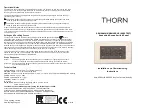
deny (for Standard IP ACLs)
To drop packets with a certain IP address, configure a filter.
Syntax
deny {
source
| any | host {
ip-address
}}[count [byte]] [dscp
value
] [order] [fragments] [log [interval
minutes
] [threshold-
in-msgs [
count
]] [monitor]
To remove this filter, you have two choices:
• Use the
no seq
sequence-number
command if you know the filter’s
sequence number.
• Use the
no deny {
source
[
mask
] | any | host
ip-address
}
command.
Parameters
source
Enter the IP address of the network or host from which the
packets were sent.
any
Enter the keyword
any
to specify that all routes are subject
to the filter.
host
ip-address
Enter the keyword
host
then the IP address to specify a host
IP address.
count
(OPTIONAL) Enter the keyword
count
to count packets
processed by the filter.
byte
(OPTIONAL) Enter the keyword
byte
to count bytes
processed by the filter.
dscp
Enter this keyword
dscp
to deny a packet based on the
DSCP value. The range is from 0 to 63.
log
(OPTIONAL) Enter the keyword
log
to enable the triggering
of ACL log messages.
order
(OPTIONAL) Enter the keyword
order
to specify the QoS
priority for the ACL entry. The range is from 0 to 254 (where
0 is the highest priority and 254 is the lowest; lower order
numbers have a higher priority) If you did not use the
keyword order, the ACLs have the lowest order by default
(255).
fragments
Enter the keyword
fragments
to use ACLs to control packet
fragments.
threshold-in
msgs
count
(OPTIONAL) Enter the
threshold-in-msgs
keyword
followed by a value to indicate the maximum number of ACL
logs that can be generated, exceeding which the generation
of ACL logs is terminated with the
seq
,
permit
, or
deny
commands. The threshold range is from 1 to 100.
interval
minutes
(OPTIONAL) Enter the keyword
interval
followed by the
time period in minutes at which ACL logs must be generated.
The interval range is from 1 to 10 minutes.
Access Control Lists (ACL)
211
















































